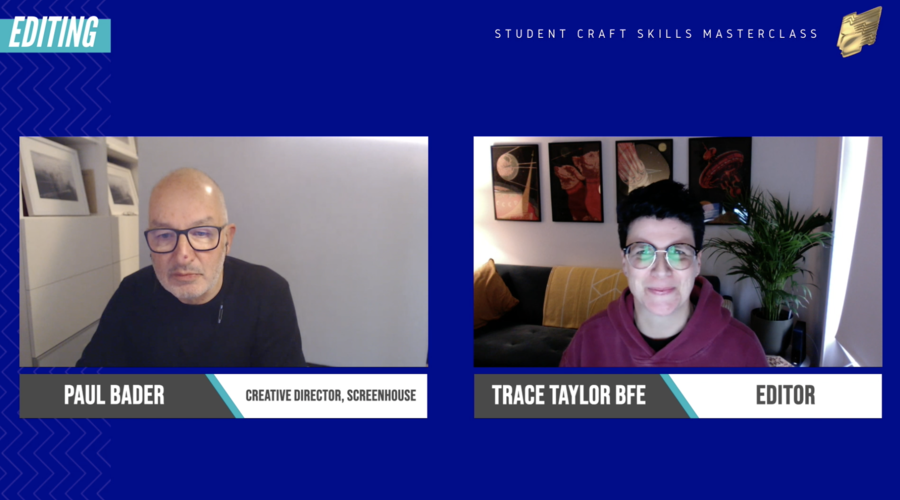Nick Fry, head of audio at Soho facility The Farm, and editor Trace Taylor gave masterclasses on sound and editing at the RTS Student Craft Skills Masterclasses 2021 on Wednesday 24 November.
Sound with Nick Fry
Nick Fry, head of audio at Soho facility The Farm, gave the Sound masterclass.
Sound in television, he said, “tells half the story’ and is “often overlooked”, but added: “With the advent of Dolby Home Atmos and new audio formats, people are appreciating it a lot more and understanding it really makes a big difference to the overall programme.”
Fry is a two-time winner of an RTS Craft & Design Award, for the sound on BBC Four documentary The Last Igloo, which tells the story of a disappearing way of life in the Arctic, and Netflix factual series Formula 1: Drive to Survive.
The Last Igloo soundtrack uses natural sounds captured by a recordist on location, rather than stock sound affects and Foley work. Fry explained: “[We were] trying to make the sound as authentic as possible to do justice to the programme and subject… I’m very proud of that work – it’s magical… The sound is really crisp and clean.”
He added: “It’s a real bonus to have a sound recordist [on location] because it takes the sound up to another level. Yes, we can fix a lot of things now, we have a lot more tools at our disposal in sound post-production… but we want to be spending time being creative with the soundtrack rather than trying to rescue it.”
Sound specialists need both technical knowledge and creativity, as well as a “passion” for sound, said Fry, who advised: “Watch TV shows at home…. If you understand how a show is constructed, you’ll then understand how to mix the show.”
Students interested in sound post-production would be well advised to follow his route into the industry. “[Starting] as a runner… is still the best way – I’d treat it like an apprenticeship,” said Fry.
At The Farm, he added, “we offer training while you’re running…. So when a position comes up as a soundtrack layer or sound editor, we can move them straight up.”
The Sound masterclass was chaired by Andrew Sheldon, creative director at True North.
Editing with Trace Taylor
Factual specialist Trace Taylor, who gave the Editing masterclass, has worked on many award-winning series over the past 15 years, including Marcus Rashford: Feeding Britain’s Children, which recently garnered two RTS North West Awards.
“I fell into editing by accident,” she recalled, revealing that a film and television BTEC course had “ignited something inside me”. She added that editing “appeals to my introvert side – I get to spend a lot time on my own in a dark room.”
Having completed the BTEC, Taylor landed some work experience at a production company, which then offered her a role as a runner. This led to a job as a production assistant, until “one of the editors took me under his wing”. She later joined the BBC, before going freelance.
Discussing the Marcus Rashford documentary, Taylor said: “It was an honour and a privilege… to be involved in telling that story.” She used news clips, recreated tweets and interviews to immerse the viewer in the football player’s campaign to feed hungry children.
Taylor described the Channel 4 series SAS: Who Dares Wins as “one of the most challenging edits in my career… you feel like you’ve done an SAS challenge at the end of the edit”.
She recommended online tutorials as a means of getting to grips with the basics of editing: “Have some skills up your sleeve… before you do any course because going in with a bit of knowledge is really helpful.” Professional body British Film Editors, she added, offers membership to students, and is a useful source of advice.
“Don’t be afraid to ask. As a women it’s very hard not to be usurped by your male colleagues – sometimes you have to put your head above the parapet and ask questions.”
The Editing masterclass was chaired by Paul Bader, creative director at Screenhouse Productions.

